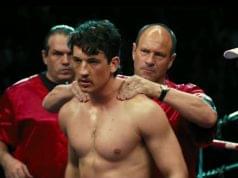“Real Steel” takes place in the near future, maybe 15 years ahead, when everything is exactly the same as it is now except that the sport of robot boxing exists. Evidently we put all our innovation eggs in the robot-boxing basket and ignored everything else. See, this is what happens without Steve Jobs.
Robot boxing sounds like the kind of premise that can’t fail. There are robots; they fight each other; what more do you need? Examine it closely, though, and you see the problem. The bots in “Real Steel” don’t have personalities and aren’t autonomous. They must be controlled step by step, punch by punch, by their human owners. That makes them principally the same thing as video-game avatars. Watching them fight is, sure enough, as exciting as watching two people play a video game.
Fortunately, the movie is less about actual scenes of robot boxing and more about a father reconnecting with his little boy. It isn’t executed very well, but at least it’s relatable. Hugh Jackman stars as Charlie Kenton, a boozy, down-and-out former boxer (actual human division) who now makes a paltry living fixing up junked robots and fighting them against bulls at rodeos and county fairs. (It says a lot about us as a society that in this scenario we are more concerned for the well-being of the robot.) Charlie is desperate and shady, taking bets he can’t cover and skipping town when he loses. He owes money to everybody.
He also has an 11-year-old son, Max (Dakota Goyo), whom he abandoned at birth and wants nothing to do with. When Max’s mother dies, Charlie is fine with letting the boy’s Aunt Debra (Hope Davis) and her rich husband (James Rebhorn) take custody rather than exercise his paternal rights — until he learns that the rich husband would prefer to be free of the kid just for the summer so he and the missus can travel in Europe. Then Charlie decides he’d be glad to “babysit” for, oh, say, $100,000.
Yes, Charlie sells his son for a hundred grand. In his defense, he was originally going to give his son away for free, because he didn’t want him. But never mind that. We can’t dwell on what a miserable, dishonest human being Charlie is, not if we’re going to go on pretending he’s a sympathetic protagonist. Lucky for us, Max is a pip — savvy, circumspect, and sensible, everything his father is not. Played by 12-year-old Dakota Goyo (who also served as the juvenile version of “Thor’s” title character), Max has enthusiasm and screen presence. When he and Charlie rebuild a junked bot named Atom and take him on the fighting circuit — mostly following Max’s business sense, not Charlie’s — one of the first things Max does is teach the robot to dance. There is no good reason for this, narratively or thematically, but it’s fun to watch a little boy and a robot do the Robot.
That’s the movie in a nutshell: very simple ideas, very simple pleasures. The reigning champion of the World Robot Boxing league is a hulking, glimmering creation called Zeus who — get this — CANNOT BE BEATEN!! Like, it’s mathematically impossible, or something. He was designed by a haughty Japanese engineer named Tak Mashido (Karl Yune) and is owned by a haughty Russian hottie named Farra Lemkova (Olga Fonda); where will this underdog, rags-to-riches story lead us?? Charlie must find redemption by using his own boxing skills to guide Atom through fights. Evangeline Lilly fills the Talia Shire role as Charlie’s on-again/off-again girlfriend who’s waiting for him to make something of himself. And so on.
All of this is modestly entertaining, I suppose, though I’d have enjoyed the film a lot more if it had been cut down to about 90 minutes. I have no problem accepting the notion of mechanical cockfighting as a real sport, with breathless ESPN play-by-play coverage and everything. (“Kenton must have hardwired this bot with the will to go on!” screams one of the announcers, hilariously.) But surely a story as elementary and essentially derivative as this one could be told more efficiently. (The screenplay is by John Gatins, writer of generically inspiring sports films like “Hardball,” “Coach Carter,” and “Dreamer.” It was directed by Shawn Levy, of “Night at the Museum” and similar fare.)
And I’m still troubled by the boxing scenes, which seem like they should be fun but aren’t. Real boxing matches are thrilling because you can root for one fighter over the other, because strategy matters, and because each punch causes a physical reaction. But when the opponents don’t feel pain and can’t strategize, who are you rooting for? The guy off to the side shouting, “Left jab! Uppercut! Uppercut!” into his robot’s voice-command module? There’s no excitement in that. Say what you will about the “Transformers” movies, at least those robots had some skin in the game, as it were.
C+ (2 hrs., 7 min.; )





